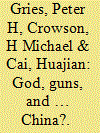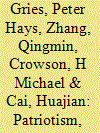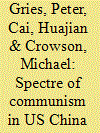|
|
|
Sort Order |
|
|
|
Items / Page
|
|
|
|
|
|
|
| Srl | Item |
| 1 |
ID:
110240


|
|
|
|
|
| Publication |
2012.
|
| Summary/Abstract |
What impact does ideology have on American attitudes and policy preferences toward China? Based on two large N surveys, we first utilize exploratory factor analysis to uncover six distinct American ideological dimensions and two distinct dimensions of attitudes toward China that distinguish between its government and its people. We then utilize structural equation modeling to explore how attitudes toward the Chinese people (i.e. prejudice) and attitudes toward the Chinese government differentially mediate relationships between ideological beliefs, on the one hand, and Americans' China policy preferences, on the other. Results suggest both direct and indirect effects of ideology on policy preferences, with the latter effects being differentially mediated by prejudice and attitudes toward the Chinese government.
|
|
|
|
|
|
|
|
|
|
|
|
|
|
|
|
| 2 |
ID:
103981


|
|
|
|
|
| Publication |
2011.
|
| Summary/Abstract |
What is the nature of Chinese patriotism and nationalism, how does it differ from American patriotism and nationalism, and what impact do they have on Chinese foreign policy attitudes? To explore the structure and consequences of Chinese national identity, three surveys were conducted in China and the US in the spring and summer of 2009. While patriotism and nationalism were empirically similar in the US, they were highly distinct in China, with patriotism aligning with a benign internationalism and nationalism with a more malign blind patriotism. Chinese patriotism/internationalism, furthermore, had no impact on perceived US threats or US policy preferences, while nationalism did. The role of nationalist historical beliefs in structures of Chinese national identity was also explored, as well as the consequences of historical beliefs for the perception of US military and humiliation threats.
|
|
|
|
|
|
|
|
|
|
|
|
|
|
|
|
| 3 |
ID:
101610


|
|
|
|
|
| Publication |
2010.
|
| Summary/Abstract |
Recent survey research suggests that, on average, Americans of all political stripes hold more positive attitudes towards the Chinese people than they do towards the Chinese government. This tendency appears more pronounced, however, among Republicans and conservatives, who are significantly more negative about the Chinese government than Democrats and liberals. 1
What best explains these two findings? In the wake of the January 2010 'Google Incident' and the Obama administration's announcement of continued arms sales to Taiwan, a February 1st People's Daily Online editorial declared that 'Cold War thinking' continues to bias Americans against China. American ideology, it argued, is imbued with a 'deeply-rooted hostility against and fear of … communism'. 2
|
|
|
|
|
|
|
|
|
|
|
|
|
|
|
|
|
|
|
|
|